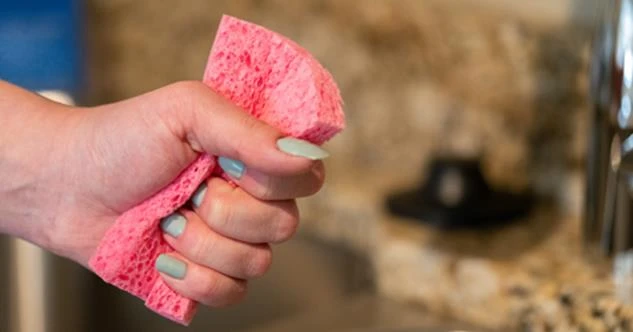
Molly Maid explains effective ways to clean kitchen sponges and whether it’s worth the effort.
|
In our last post, we learned that kitchen sponges are one of the dirtiest things in the house. In fact, they harbor more germs per square inch than anything else in your home. 75 percent of kitchen sponges even test positive for coliform bacteria, an indicator of fecal contamination. Now that’s gross.
A 2017 study published in Scientific Reports led to several headlines like, “Your Kitchen Sponge Is Gross, and Cleaning It Isn’t Helping” and “Cleaning a Dirty Sponge Only Helps Its Worst Bacteria, Study Says.” Understandably, a lot of people are confused about whether they should bother washing their sponges.
After reviewing the data, numerous scientists have come out and said those headlines are misleading. Learn the truth about sponge germs and how to keep your family safe from bacteria that can make you sick.
Ways to Clean a Kitchen Sponge
You could replace your sponge every day to reduce your exposure to disease-causing bacteria, but the cost would add up quickly. Save money by reusing your sponges but clean them in between to keep them sanitary. Here’s how:
- Microwave: The most common question people have is whether microwaving sponges kills germs. Yes—popping a moist sponge in the microwave for one to two minutes eliminates most bacteria. This is a quick and easy way to wrap up nightly dish duty. Remember to wring out the sponge and set it on a wire rack where it can dry quickly.
- Dishwasher: You can also clean kitchen sponges in the dishwasher alongside your dirty dishes. Use the “heated dry” setting and open the dishwasher door promptly to encourage faster drying.
- Vinegar: If you want to avoid harsh bleach, you can use vinegar instead. Soak kitchen sponges in undiluted vinegar for five minutes. This natural disinfectant eliminates most bacteria, though not quite as effectively as bleach. Rinse each sponge, wring it out, and let it air dry.
Replacing Your Kitchen Sponges
We recommend swapping out your sponge for a fresh one every two to three weeks to prevent harmful bacteria from multiplying in their millions.
Better yet, trade out your kitchen sponge for other tools that are easier to clean and reuse. For instance, you can toss washcloths and microfiber cloths in the laundry at the end of the day, and you can run scrub brushes through the dishwasher every time you start a cycle. These are much more sanitary tools to use in the kitchen. Reserve sponges for dirtier jobs, such as cleaning the bathtub, washing the car, and scrubbing out the cat’s litter box.
Get More Cleaning Help from Molly Maid
Your kitchen sponge is one tiny piece of the household cleaning puzzle. If you don’t have time to tackle all your chores throughout the week, get extra help from Molly Maid. Our uniformed, experienced professionals can provide a single deep-cleaning, occasional assistance with household chores, or routine help around the house.
Contact your local Molly Maid or call us to request a free in-home estimate for professional house cleaning services near you.
